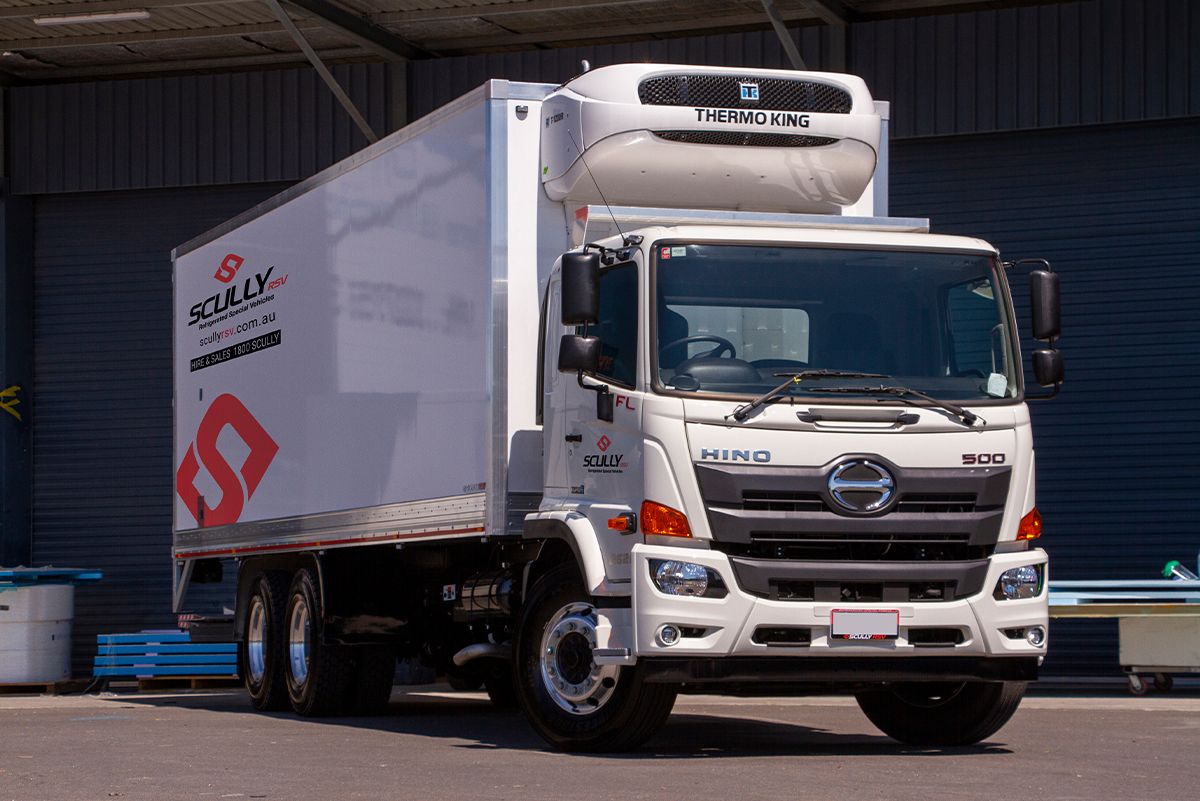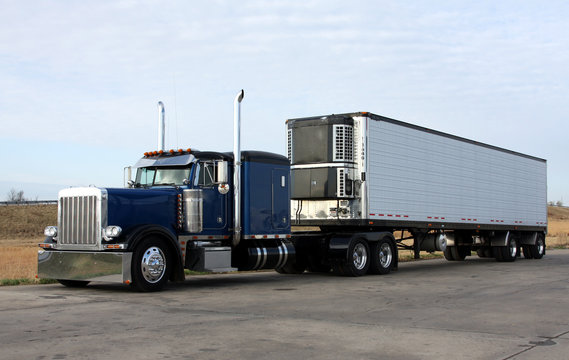Thermo King Transport Refrigeration: Quality Air Conditioning for Cargo
Thermo King Transport Refrigeration: Quality Air Conditioning for Cargo
Blog Article
Leading Innovations in Transport Refrigeration: Enhancing Efficiency and Safety And Security
The landscape of transport refrigeration is going through considerable change, driven by developments intended at enhancing both efficiency and safety and security. As these technologies continue to advance, it is essential to discover their implications on functional techniques and regulative conformity, motivating a closer examination of exactly how they improve the future of transportation refrigeration.
Smart Temperature Level Monitoring Systems
In the world of transportation refrigeration, clever temperature level monitoring systems have actually emerged as a crucial advancement for making certain the integrity of temperature-sensitive products. These innovative systems take advantage of Web of Things (IoT) technology to give real-time information on temperature level variations, enabling drivers to preserve optimum problems throughout the supply chain. By continuously tracking the temperature level of refrigerated containers and vehicles, business can swiftly identify variances that may endanger product top quality.

Furthermore, clever surveillance systems typically include automated informs and notifications, permitting stakeholders to respond quickly to any kind of potential issues. This proactive approach not just decreases the danger of putridity yet also boosts conformity with regulatory criteria regulating food security and pharmaceutical transportation.
The assimilation of information analytics within these systems likewise assists in anticipating maintenance, aiding operators to visualize prospective tools failures before they happen. This capability minimizes downtime and optimizes functional efficiency, inevitably causing set you back savings.
Eco-Friendly Refrigerants
Smart temperature level monitoring systems play an essential function in preserving item quality, but the performance of transportation refrigeration likewise depends upon the selection of cooling agents utilized. As ecological issues increase, the change towards environment-friendly cooling agents has come to be critical. Standard refrigerants, such as hydrofluorocarbons (HFCs), are notorious for their high Global Warming Prospective (GWP), contributing dramatically to environment modification. On the other hand, emerging options like hydrocarbon-based refrigerants and hydrofluoroolefins (HFOs) existing lower GWP choices, offering both performance and sustainability.
These environmentally friendly refrigerants not just minimize environmental effect however additionally line up with global laws targeted at terminating harmful substances. Their fostering can lead to enhanced power effectiveness, eventually decreasing operating prices for transportation refrigeration systems. The usage of natural refrigerants, such as ammonia and carbon dioxide, has actually acquired traction due to their outstanding thermodynamic buildings and reduced environmental impact.
Investing in environmentally friendly cooling agents is not merely a regulatory conformity step; it stands for a calculated decision that improves brand name track record and promotes client commitment. refrigerated transportation thermo king. By focusing on lasting methods, business can add to a greener future while guaranteeing the stability of moved products
Advanced Insulation Products
Using innovative insulation products is important for enhancing transportation refrigeration systems, as they significantly boost energy efficiency and keep consistent temperature control. Traditional insulation methods commonly drop short in stopping thermal transfer, bring about enhanced power consumption and varying temperature levels within cooled areas.
Emerging materials such as vacuum cleaner insulated panels (VIPs) and aerogels supply premium thermal resistance, allowing for thinner accounts without endangering performance. VIPs, as an example, make use of a vacuum cleaner layer to lessen convective and conductive warmth transfer, making them excellent for space-constrained applications. Aerogels, recognized for their porous and lightweight framework, Continue provide exceptional insulation while considerably decreasing overall system weight.
Furthermore, including phase adjustment products (PCMs) into insulation systems can further support temperatures during transit. These products take in and launch thermal power, effectively buffering against outside temperature level variations.
The combination of these sophisticated insulation materials not only minimizes the functional prices related to energy intake but also expands the life span of temperature-sensitive goods. As the transport refrigeration market continues to evolve, the fostering of cutting-edge insulation innovations will certainly be essential in improving both effectiveness and safety in cooled transportation.
Automated Course Optimization
The performance of transportation refrigeration systems is greatly enhanced with automated course optimization, which leverages sophisticated formulas and real-time data to figure out the most effective paths for shipment. By examining various variables such as website traffic patterns, weather, and delivery home windows, these systems can dramatically minimize travel time and fuel consumption.
Automated route optimization minimizes human error and subjective decision-making, which can bring about inadequacies. This innovation enables fleet supervisors to designate resources better, making sure that refrigerated products preserve their called for temperature level throughout the trip. By optimizing courses, firms can likewise boost consumer contentment via prompt distributions.
In addition, automated systems can adjust to unforeseen conditions, such as road closures or sudden web traffic spikes, enabling vibrant rerouting. This versatility not just shields the honesty of temperature-sensitive products yet also adds to general functional performance.
Implementing automated course optimization can result in substantial expense savings while lowering the carbon impact connected with transportation. As services increasingly prioritize sustainability, this advancement stands out as a critical part in modern transport refrigeration, straightening operational goals with environmental obligation. Eventually, automated path optimization stands for a substantial advancement in the mission for effectiveness and safety and security in transport refrigeration.

Real-Time Data Analytics
Automated route optimization significantly take advantage of the integration of real-time data analytics, which provides important insights right into the efficiency of transportation refrigeration systems. By using real-time data, transportation operators can keep an eye on temperature level variations and equipment performance, making certain that subject to spoiling products are preserved within needed criteria throughout transit. This aggressive approach not only boosts the quality of the carried products but also reduces the threat of putridity and loss.

In enhancement to improving effectiveness, real-time analytics enhances safety and security by making sure conformity with regulative requirements you could try here for temperature level control. This not just secures public health and wellness yet also fortifies a business's credibility - thermo king transport refrigeration. As the transport refrigeration sector advances, the combination of real-time information analytics becomes a keystone for driving innovation, sustainability, and functional excellence
Final Thought
In final thought, the innovations in transport refrigeration considerably enhance both performance and safety and security within the sector. Collectively, these innovations stand for a vital evolution in transport refrigeration, guaranteeing conformity with regulative criteria and promoting a greener future.
The landscape of transport refrigeration is undertaking substantial improvement, driven by developments intended at improving both efficiency and safety and check this security.Smart temperature level surveillance systems play a crucial role in maintaining item high quality, but the effectiveness of transportation refrigeration additionally pivots on the choice of cooling agents utilized. Their fostering can lead to improved power performance, eventually reducing operating expenses for transportation refrigeration systems. Ultimately, automated course optimization stands for a substantial development in the quest for effectiveness and safety in transportation refrigeration.
In verdict, the improvements in transport refrigeration substantially enhance both performance and safety within the sector.
Report this page